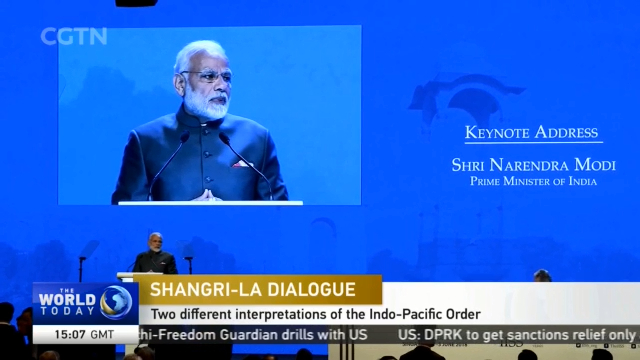
07:59, 04-Jun-2018
Shangri-La Dialogue: Two different interpretations of the Indo-Pacific Order
03:23

This year's Shangri-La Dialogue, an annual security summit staged in Singapore, marked the formal coming of age of the "Indo-Pacific theater". But there are two different interpretations of the Indo-Pacific Order. Our correspondent Miro Lu has more.
Indian Prime Minister Narendra Modi delivered the keynote address at this year's Shangri-La Dialogue, just days after the U.S. renamed its "US Pacific Command" to "Indo-Pacific Command" in a nod to India's rising security role in the region.
Modi's speech was confident yet relatively subdued. He called for ASEAN centrality and unity, and endorsed a vision where middle powers, rather than superpowers, serve as anchors of stability and prosperity.
NARENDRA MODI INDIAN PRIME MINISTER "Inclusiveness, openness and ASEAN centrality and unity, therefore, lie at the heart of the new Indo-Pacific. India does not see the Indo-Pacific Region as a strategy or as a club of limited members."
Nor as a grouping that seeks to dominate. And by no means do we consider it as directed against any country. A geographical definition, as such, cannot be. India's vision for the Indo-Pacific Region is, therefore, a positive one.
SENIOR COLONEL ZHOU BO DIRECTOR, SECURITY COOPERATION CENTRE, OFFICE FOR INTERNATIONAL MILITARY COOPERATION, CENTRAL MILITARY COMMISSION "This Indo-Pacific concept is actually not very much high as it was before the meeting because Prime Minister Modi from India actually played down the military significance of this idea. Actually, I don't think he touched on any possible military significance of this idea."
In a striking contrast, the U.S. Defense Secretary James Mattis took a hardline tone in his presentation, reiterating his country's centrality to preserving a rules-based order in Asia.
James Mattis Secretary of Defense, US "Make no mistake: America is in the Indo-Pacific to stay. This is our priority theater, our interests, and the regions are inextricably intertwined."
LANXIN XIANG, PROFESSOR, GRADUATE INSTITUTE OF INTERNATIONAL AND DEVELOPMENT STUDIES, GENEVA "The message is Americans try to create a regional security framework that is dominated by the United States, of course, but at the same time, hoping to get as many partners in the region for the purpose of restraining or they probably like to use rebalancing the rise of China. The problem for that strategy is that it declares the strategy being free and open but the way Mattis expressed or described, it looks like a very exclusive rather than inclusive."
"Analysts are skeptical of the American version of the Indo-Pacific order. They argue that US imploded its own system which they created this divide between economic engagement and security involvement. Talking about rules-based order makes no sense only in the security area. As for the name change from Asia-Pacific to Indo-Pacific, Colonel Zhou quoted Shakespeare as saying 'a rose by any other name would smell as sweet. But if it's not a rose, even if you change the name, it will not be fragrant.' Miro Lu, CGTN, Singapore."

SITEMAP
Copyright © 2018 CGTN. Beijing ICP prepared NO.16065310-3
Copyright © 2018 CGTN. Beijing ICP prepared NO.16065310-3